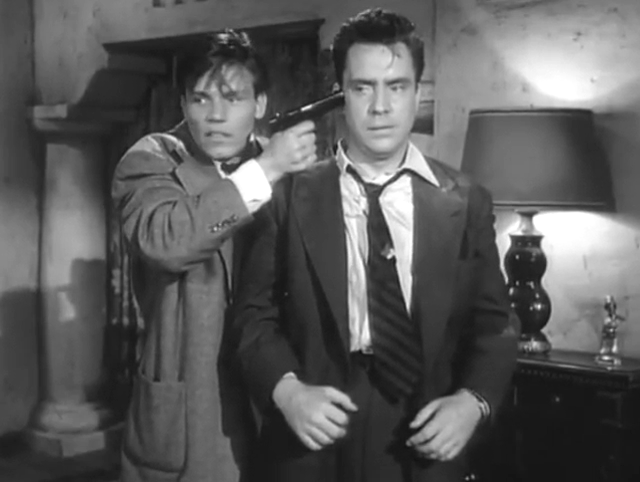 |
| Neville Brand and Edmond O'Brien in D.O.A. |
Who knew that being a notary public could be so dangerous? D.O.A. is a frenetic, mostly implausible thriller that somehow works, even though no one in it acts like a human being. I mean, if you found that you'd been poisoned and had only a short time to live, you'd get in touch with the police, check into a hospital, and call your loved ones, right? Not Frank Bigelow, a tax accountant on a rather odd vacation to San Francisco, who visits a jazz bar where he's given a drink containing a "luminous toxin." The next morning, feeling a little unwell, he goes to a doctor who gives him the bad news, so he rushes to a hospital for a second opinion, and then, following a slim lead, rushes to Los Angeles to try to find out why he's being done in. All this rushing, which includes a famous tracking shot of Bigelow running down Market Street, elbowing aside the crowds, can't have been good for him, perhaps only speeding up the effects of the poison. But by this time we have been so caught up in his plight that we don't really care. One of the reasons is that Edmond O'Brien, an actor who was typically a kind of movie Everyman, is perfectly cast as Bigelow. The other is that Rudolph Maté, abetted by a pounding score by Dimitri Tiomkin, never gives us time for anything so mundane as thought. It's a film full of absurdities, starting with Bigelow's curiously distant relationship with his secretary and lover, Paula (Pamela Britton), and continuing through his arrival at a hotel in San Francisco during "Market Week," where hordes of salesmen, clients, and (presumably) hookers are partying. (I don't know who thought it was a great idea to add a slide-whistle wolf whistle on the soundtrack every time a pretty woman appears on screen. Surely it isn't indicated on Tiomkin's score.) Anyway, Bigelow gets swept away to a bar where a lot of hipsters are grooving to some hyped-up jazz, and it's there that he gets slipped the mickey. The film takes off and never lets up from there, with some fisticuffs and gunplay and a toothy psychopath named Chester (Neville Brand), as the plot thickens so much that by the end I really couldn't tell you why Bigelow's notarizing a bill of sale put him in such final jeopardy. Nor do I care: By the end, I was so exhausted by its audacious silliness that I was content to accept it as the classic good bad movie.